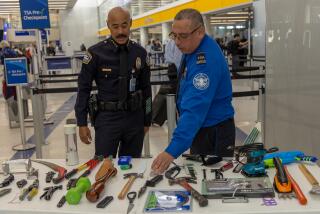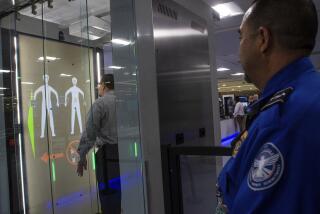Travel group offers plan to speed airport screening
A new plan by the U.S. Travel Assn. to speed the screening process at the nation’s airports has come under fire from airlines and a private security firm.
The nation’s largest travel promotion group released the plan last week after a yearlong study by security experts, including former Department of Homeland Security Secretary Tom Ridge and former Rep. Jim Turner (D-Texas).
The plan includes a few new ideas and some that have been tried without success before. Still, Geoff Freeman, executive vice president of the travel association, called it a “win-win for everyone.”
One key component of the plan calls on the Transportation Security Administration to create a voluntary “trusted traveler” program that lets passengers who provide personal information get pre-approval to bypass long security lines.
Freeman said such a government-run program, funded by fees charged to participating travelers, would help speed airport lines.
But it is not a new idea. The TSA tested a similar concept on a pilot basis in 2004 before turning it over to several private companies, but the private companies failed in 2009 because of financial troubles. Alclear, a New York company, has revived the program at airports in Orlando, Fla., and Denver.
An Alclear spokesman opposes the idea of bringing the government back into the business of pre-clearing passengers.
“The government doesn’t have to run the program but should absolutely regulate it,” said Gareth Edmondson-Jones, chief brand officer for Alclear.
Another key element of the association’s plan is to let every passenger check one bag free so passengers won’t slow the screening process by cramming all their belongings into carry-on luggage.
But the Air Transport Assn., the trade group that represents most major airlines, blasted the idea. It said the government shouldn’t dictate what airlines should offer free.
The proposal, the group said, “diminishes customer choice and competitive differentiation among carriers.”
•Anyone who has traveled in the last two years has benefited from lower airfares and hotel rates, pushed down by declining demand amid the worst recession in a generation.
But travel experts say airfares and hotel rates could climb back to pre-recession levels this year.
“Based on continued economic growth, increased demand and constrained capacity, airfare and hotel rates are expected to grow up to high single digits in 2011,” according to a report released last week by American Express Global Business Travel, the corporate travel branch of the credit card company.
For example, American Express says the average domestic airline ticket cost $246 in 2008, when the recession took hold. The price dropped to $216 in 2009 and then climbed back up to $231 last year as the economy improved.
With rising fuel costs affecting airlines, the report predicted that airfares would continue to climb.
•The price of cotton has more than doubled in the last six months, and that has hotel owners worried about how much they are losing when guests walk off with their towels and sheets.
As a result, a Florida company that developed a device to pinpoint the location of towels, sheets and pillowcases says it has been inundated with calls from hotel owners.
“We are seeing a flurry of interest,” said Jonathan Eisenberg, vice president of Linen Technology Tracking of Miami. The company uses thumb-size radio-frequency identification tags sewn into hotel linen to keep an accurate inventory.
He said the technology was being used in three hotels, including a five-star hotel in Honolulu that had previously lost an average of 4,000 towels a month.
The hotel warns guest to return the towels or face charges of $10 each. Eisenberg said the tracking device had helped lower the number of lost towels at the hotel to about 50 a month.






